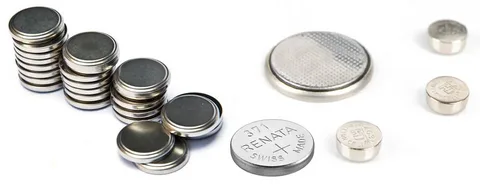In the rapidly evolving automotive industry, variable resistors play a pivotal role in ensuring precision, control, and efficiency in electronic systems. From adjusting dashboard lighting to optimizing sensor performance, variable resistors enable dynamic control of current and voltage in automotive circuits. Jinxinyang Tech, a Global PCB & Components One-Stop Solution accessible at https://www.szjxy-ic.com/, supplies high-quality variable resistors alongside a comprehensive range of components, including integrated circuits, discrete semiconductors, capacitors, resistors, inductors, isolators, circuit protection devices, relays, RF/IF and RFID components, audio products, sensors, transducers, transformers, tools, test and measurement equipment, switches, soldering products, motors, line protection, industrial automation controls, hardware, embedded computers, development boards, power supplies, potentiometers, optoelectronics, memory cards, magnetics, filters, crystals, oscillators, resonators, and connectors. This article explores how variable resistors enhance automotive electronics, the benefits of partnering with Jinxinyang Tech, and strategies for optimizing their use in modern vehicles.
The Role of Variable Resistors in Automotive Electronics
A variable resistor is an electronic component that allows users to adjust resistance manually or electronically, controlling current or voltage in a circuit. Available as potentiometers, rheostats, or digital potentiometers, variable resistors are essential in automotive applications requiring real-time adjustments. In vehicles, they power systems like dashboard dimmers, throttle position sensors, and climate control units. With a global market for variable resistors exceeding $15 billion and annual production of approximately 20 billion units, their importance in automotive electronics is undeniable.
In automotive systems, variable resistors work alongside sensors, integrated circuits, and optoelectronics from Jinxinyang Tech to ensure precise functionality. For instance, throttle position sensors use variable resistors to adjust resistance based on pedal position, enabling accurate engine control. Dashboard dimmers rely on potentiometers to regulate lighting intensity, enhancing driver comfort. Poor-quality variable resistors can lead to erratic performance, signal noise, or system failures, compromising vehicle safety and efficiency. Jinxinyang Tech’s variable resistors meet stringent standards like RoHS and ISO, ensuring reliability and durability. By integrating these components with circuit protection devices and test and measurement equipment, manufacturers can develop robust automotive electronics.
Why Choosing the Right Variable Resistor Matters
Selecting the appropriate variable resistor is critical for automotive electronics due to the following benefits:
- Precision Control: Digital variable resistors offer high accuracy for applications like throttle sensors, ensuring precise engine performance.
- Durability: High-quality variable resistors withstand harsh automotive environments, including temperature fluctuations and vibrations.
- Safety: Compliance with global standards prevents failures like short circuits, critical for vehicle safety systems.
- Compact Design: The small size of variable resistors fits space-constrained automotive modules, maintaining sleek designs.
- Cost Efficiency: Affordable variable resistors balance performance and cost, ideal for mass-produced vehicles.
Sourcing variable resistors from Jinxinyang Tech at https://www.szjxy-ic.com/ ensures manufacturers can meet the rigorous demands of automotive applications.
The Jinxinyang Tech Advantage for Automotive Applications
Jinxinyang Tech provides a competitive edge for automotive electronics manufacturers through:
- Comprehensive Component Portfolio: Variable resistors, sensors, integrated circuits, optoelectronics, and circuit protection devices offer a one-stop solution for automotive PCB design.
- Stringent Quality Control: All variable resistors undergo rigorous testing to meet automotive-grade standards, ensuring reliability in demanding conditions.
- Global Supply Chain: Jinxinyang Tech’s robust supply chain ensures consistent availability, supporting high-volume production for automotive manufacturers.
- Expert Technical Support: Guidance on selecting the right variable resistor for specific applications, such as high-precision sensors or low-power dimmers, streamlines development.
- Cost-Effective Solutions: Competitive pricing ensures affordability without compromising quality, critical for automotive production.
Visit https://www.szjxy-ic.com/ to explore Jinxinyang Tech’s offerings and enhance automotive electronics with reliable components.
Trends Driving Demand for Variable Resistors in Automotive Electronics
The automotive industry is shaped by trends that increase the demand for variable resistors:
- Advanced Driver-Assistance Systems (ADAS): Sensors in ADAS use variable resistors for precise signal adjustments, improving safety features like lane-keeping assist.
- Electric Vehicles (EVs): Variable resistors regulate power in EV battery management systems, optimizing charging and performance.
- Smart Infotainment Systems: Dashboard controls use potentiometers for user-friendly adjustments of audio and lighting settings.
- Connected Vehicles: RF/IF components paired with variable resistors enable real-time data transmission in IoT-enabled vehicles.
- Sustainability: Long-lasting digital variable resistors reduce maintenance, supporting eco-friendly automotive designs.
Jinxinyang Tech’s variable resistors and complementary components align with these trends, enabling manufacturers to innovate in the automotive sector.
Best Practices for Selecting and Using Variable Resistors in Automotive Electronics
To optimize automotive electronics performance, manufacturers should follow these best practices:
- Verify Device Specifications: Check the system requirements for resistance range, power rating, and adjustment mechanism. High-precision applications like throttle sensors benefit from digital variable resistors, while low-power dimmers can use mechanical potentiometers.
- Choose the Right Type: Use digital variable resistors for applications requiring precise, electronically controlled adjustments, such as ADAS sensors. Mechanical potentiometers are suitable for manual controls like dashboard dimmers.
- Consider Environmental Factors: Select variable resistors designed for automotive conditions, with resistance to temperatures (-40°C to 125°C), vibrations, and humidity. Jinxinyang Tech’s components are tested for durability in harsh environments.
- Avoid Mixing Components: Using mismatched variable resistors can cause signal noise or system failures. Ensure compatibility with other components like sensors and integrated circuits.
- Source from Trusted Suppliers: Partner with Jinxinyang Tech at https://www.szjxy-ic.com/ to source authentic variable resistors, avoiding counterfeits that may underperform or pose safety risks.
- Test Performance: Use test and measurement equipment from Jinxinyang Tech to validate variable resistor performance in prototypes, ensuring accuracy and reliability before mass production.
- Ensure Safe Integration: Secure variable resistors in vibration-resistant mounts to prevent mechanical wear in automotive environments. Regularly inspect for wear or noise in mechanical types.
Case Study: Enhancing Throttle Position Sensors with Variable Resistors
A manufacturer developing a throttle position sensor for electric vehicles partnered with Jinxinyang Tech to source variable resistors and components. They selected digital potentiometers for their high accuracy, powering sensors to monitor pedal position and integrated circuits for data processing. Circuit protection devices ensured reliability in high-vibration environments, while test and measurement equipment validated performance. The result was a precise, durable sensor that optimized EV performance, showcasing the value of Jinxinyang Tech’s variable resistors in automotive applications.
Safety Considerations for Variable Resistors in Automotive Electronics
Safety is paramount when using variable resistors in automotive systems:
- Prevent Short Circuits: Ensure proper insulation and circuit protection devices to avoid electrical faults that could compromise vehicle safety.
- Mitigate Wear: Mechanical variable resistors can wear out due to vibrations; use digital types for critical applications to enhance longevity.
- Test for Environmental Resilience: Verify that variable resistors can withstand automotive conditions like extreme temperatures and humidity.
- Check for Authenticity: Counterfeit variable resistors may cause erratic performance or safety risks. Jinxinyang Tech’s components feature clear labeling to ensure authenticity.
Comparison of Variable Resistor Types for Automotive Use
| Type | Application | Key Features | Best For |
| Potentiometer | Voltage control | Three terminals, manual adjustment | Dashboard dimmers, audio controls |
| Rheostat | Current control | Two terminals, high power capacity | Motor speed controls |
| Digital Potentiometer | Precise digital adjustments | Electronic control, high accuracy | Throttle sensors, ADAS systems |
Digital variable resistors are ideal for precision-driven automotive applications, while mechanical types suit manual controls.
Conclusion
Jinxinyang electronic components, including variable resistors, enhance automotive electronics with precise, reliable, and durable power control. Jinxinyang Tech’s comprehensive portfolio and global supply chain empower manufacturers to create advanced vehicle systems. By sourcing variable resistors from https://www.szjxy-ic.com/, businesses can ensure performance, safety, and innovation in the competitive automotive electronics market.


